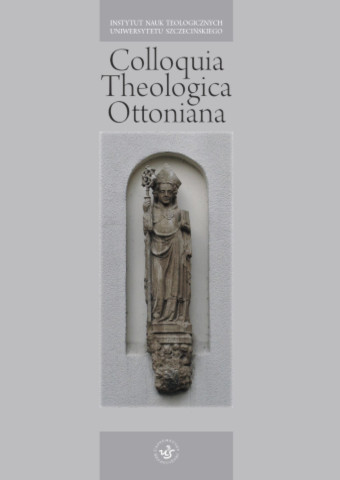
ISSN: 1731-0555
eISSN: 2353-2998
OAI
DOI: 10.18276/cto.2016.1-02




Issue archive /
1/2016
Moraltheologischen implikationen des glaubens nach der apostolichen exhortation evangelii Gaudium des Papsted Franziskus
(Moralno-teologiczne implikacje wiary w świetle dhortacji Evangelii Gaudium Franciszka)
| Authors: |
Grzegorz
Chojnacki
Wydział Teologiczny Uniwersytetu Szczecińskiego |
| Keywords: | culture truth freedom love covenant |
| Data publikacji całości: | 2016 |
| Page range: | 14 (29-42) |
Abstract
Pope Francis puts special emphasis in his teaching and pastoral activities on the need for evangelisation which is to awaken (reawaken) the readiness to revive the grace that flows out from the gift of faith being received. Especially, the relationship to the Triune God must be deepened and intensified; this is about renewing the covenant with God, the heart of which is the virtue of love in which the love of man for God and his / her loving devotion to his / her Creator is being revealed. Pope Francis sees a great need to revive the love of man for God that will make that His commandments are easy to meet. This is because the love for God does not spring from keeping of commandments only but a special type of moralism may arise which will consist in external fulfilment of orders and prohibitions, without authentic life of faith and with faith. The love of man for God makes him to want to live in truth which is the real guarantor of freedom and contributes to social application of the principle of the ordo caritatis.
Download file
Article file
Bibliography
| 1. | Augustinus, In lohannis Evangelium Tractatus 82, 3, in: CCL 36, 533. |
| 2. | Benedikt XVI., Ansprache beim Treffen mit den Vertretern aus dem Bereich der Wissenschaften (12. September 2006), http://w2.vatican.va/content/benedict-xvi/de/speeches/2006/september/documents/hf_ben-xvi_spe_20060912_university-regensburg.html. |
| 3. | Celary I., Die Lehre des Papstes Franziskus über die Verantwortung der Laien für die Pfarrgemeinde im Apostolischen Schreiben Evangelii gaudium, „Teologia Praktyczna” 15 (2014), S. 161–168. |
| 4. | Chojnacki G., „Ein gutes Leben führen”. Die Rezeption der Enzyklika Laudato si’ vom Papst Franziskus im deutschen ökumenischen Dialog, „Studia Oecumenica” 15 (2015), S. 41–54. |
| 5. | D’Sa X.F., Das Evangelium gaudii von Papst Franziskus, in: K. Krämer, K. Vellguth (Hg.), Evangelii gaudium. Stimmen der Weltkirche, Freiburg im Breisgau 2015, S. 21–40 |
| 6. | Franziskus, Apostolische Exhortation Evangelii gaudium (Verlautbarungen des Apostolischen Stuhls Nr. 194), Bonn 2013. |
| 7. | Garhammer E., „Christus als Meister der Kommunikation”. Das Zweite Vatikanische Konzil und die Medien, „Roczniki Teologiczne” LXI (2014) Heft Nr. 12, S. 105–116. |
| 8. | Hildebrand von D., Koń trojański w mieście Boga, Warszawa 2006. |
| 9. | Horak T., Kto nam kradnie misyjny entuzjazm, „Pastores” 65 (2014), S. 113–122. |
| 10. | Mąkosa P., Dynamika ewangelizacji według adhortacji apostolskiej „Evangelii gaudium” papieża Franciszka, „Studia Pastoralne” 10 (2014), S. 327–340. |
| 11. | Pyc M., Chrystologiczny wymiar ewangelizacji w świetle adhortacji „Evangelium gaudium”, „Teologia Dogmatyczna” 9 (2014), S. 7–19. |
| 12. | Słotwińska H., Via pulchritudinis katechezy Kościoła, in: P. Sroczyński (Hg.), Katecheza Kościoła współczesnego. Refleksja poświęcona katechezie w świetle adhortacji papieża Franciszka „Evangelii gaudium”, Legnica 2015, S. 15–42. |
| 13. | Szmulewicz H., Pilne zadanie uczniów Chrystusa: Głosić radość ewangelii we współczesnym świecie, „Tarnowskie Studia Teologiczne” 33 (2014) Nr. 1, S. 137–150. |
| 14. | Szulist J., Dialog wyznacznikiem relacji we wspólnocie politycznej w kontekście nauczania papieża Franciszka, „Studia Gdańskie” XXXV (2014), S. 111–123. |
| 15. | Wejman G., Modele chrystianizacji ludów basenu Morza Bałtyckiego – podobieństwa i różnice, „Studia Paradyskie” 24 (2014), S. 247–260. |